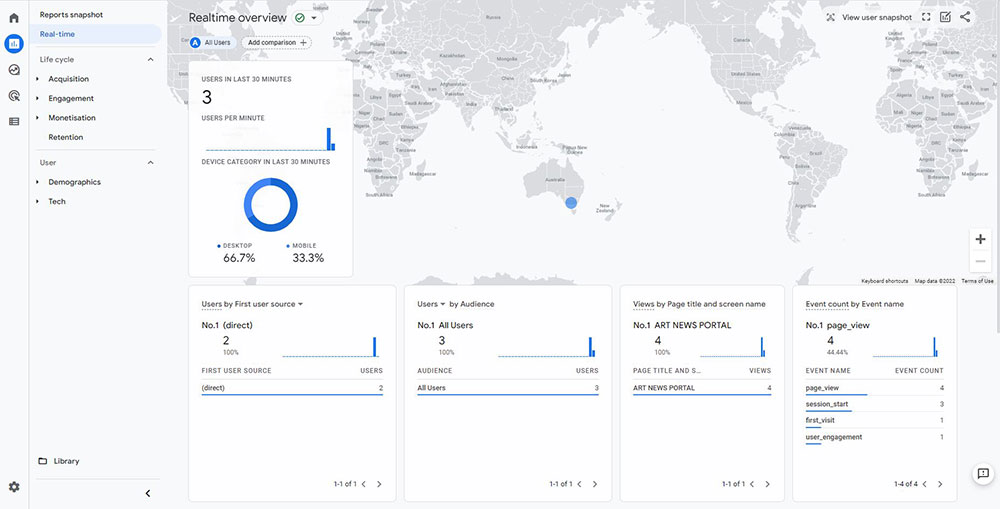Insights

Google Universal Analytics to be discontinued from 1st July 2023
Google Analytics was officially launched on the 14th of November 2005. As of 2019, Google Analytics has been the most widely used web analytics service on the internet.
After all those years Google Analytics known officially as Universal Analytics (UA) is now going to be phased out and replaced by Google Analytics 4 (GA4).
You might have noticed this message in your Analytics account: “Universal Analytics will no longer process new data in standard properties beginning 1 July 2023. Prepare now by setting up and switching over to a Google Analytics 4 property.”
What is Google Analytics 4?
Google Analytics 4 (GA4) beta was released in 2019 and is currently the default installation of Google Analytics.
The new GA4 comes with plenty of new key features and improvements.
One of the biggest differences is the new data modelling feature that uses artificial intelligence to fill gaps in the data where traditional Analytics may have been blocked by cookie-consent rules for example.
The main benefits we see are the improved cross device and customer journey tracking as well as simplified setup of goals and events.
Key differences between Google Universal Analytics (UA) and GA4.
Different measuring models
The biggest difference between UA and GA4 is the measuring model. UA uses a model based on sessions and pageviews whereas GA4 uses a model based on events and parameters.
This means all UA hit types translate to events in GA4.
Events in GA4 are grouped into 4 categories.
- Automatically collected events including page_views, first_visit and session_start
- Enhanced Measurement events including scrolls, outbound clicks, site search or video engagement
- eCommerce recommended events recommended by google depending on industry
- Custom Events you can setup and create
GA4 also creates a single user journey from all the data associated with the same user ID. The benefit of this method is that you can now track how a particular user actually interacts with your website.
Better cross device reporting
UA tracks users via cookies or device ID. If you for example visit the same website using a different browser you are also considered a different user. This makes cross device tracking almost impossible.
In GA4 on the other hand it is easier to get a better understanding of the customer journey with cross device insights tracking via User ID, Google Signals and Client ID.
The reporting interface
The user-interface for the new default Google Analytics is very different. It might take you a while to find your ways around it. One of the major benefits though is that GA4 will allow marketers to edit, correct and fine-tune the way events are tracked in their analytics without having to access on-site code.
Removal of monthly hit limits
Historically UA had a monthly limit of 10 million hits. Such a limit is now gone in GA4.
Instead of the hit limit GA4 has introduced a limit on the number of events captured at 500.
Free connection to BigQuery
BigQuery for Analytics is a cloud data warehouse that lets you run super-fast queries of large datasets.
BigQuery takes the data out of GA and gives you the ability to analyse it without the issue of sampling.
This feature was only available in Analytics 360, part of the paid Google Marketing Platform but now GA4 comes with a free connection to BigQuery as well.
Better ROI
Providing highly insightful analytics reports you now also have the opportunity to plan your campaigns better and target the relevant audience within the timeframes that matter.
Understand what's going to happen to your Google Universal Analytics data
After July 1, 2023, you'll be able to access your previously processed data in your Universal Analytics property for at least six months.
We know your data is important to you, and we strongly encourage you to export your historical reports during this time.
There are currently several ways to export data from your Universal Analytics property. Export individual reports into the following formats EG: CSV, Excel (XLSX) Google Sheets or PDF.
Should you switch to GA4?
The answer is quite simple... YES. Mainly because you don’t really have a choice. As mentioned earlier, Universal Analytics will be discontinued from 1st July 2023.
Google recommends a dual tag approach: By dual tagging you can keep your Universal Analytics implementation in place while you build out your Google Analytics 4 implementation.
This dual-tagging approach lets you build a historical record (and your skill base) in Google Analytics 4 while continuing to depend on Universal Analytics until you're ready to switch over.
Our team is more than happy to assist. Get in touch with an expert now.
